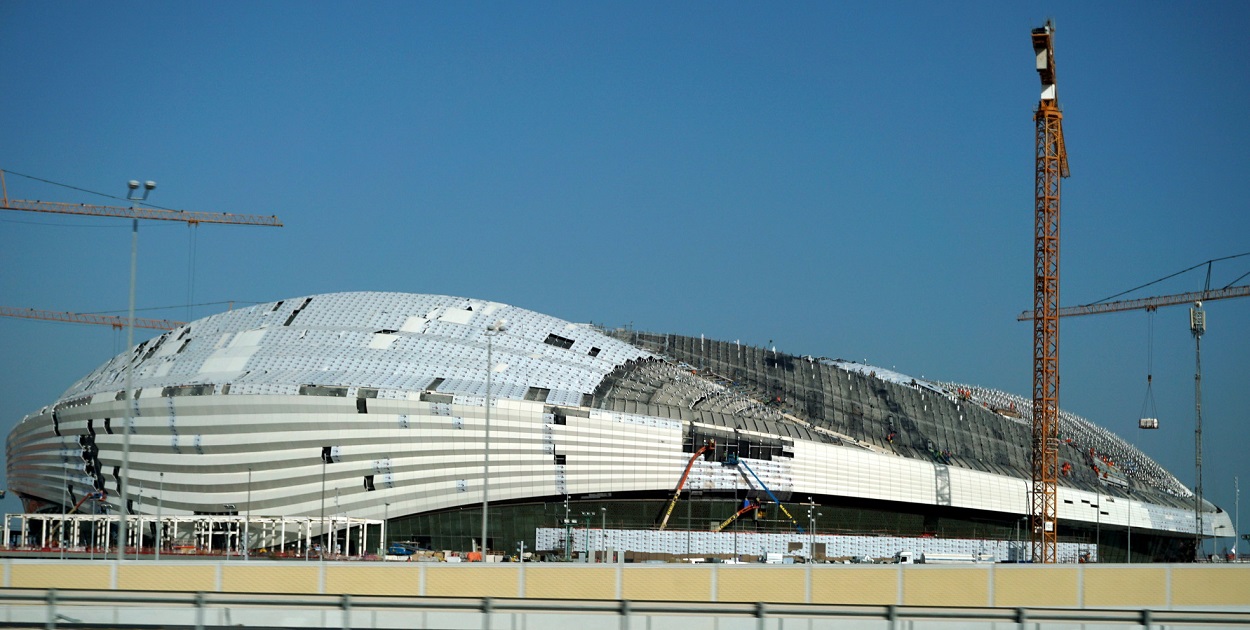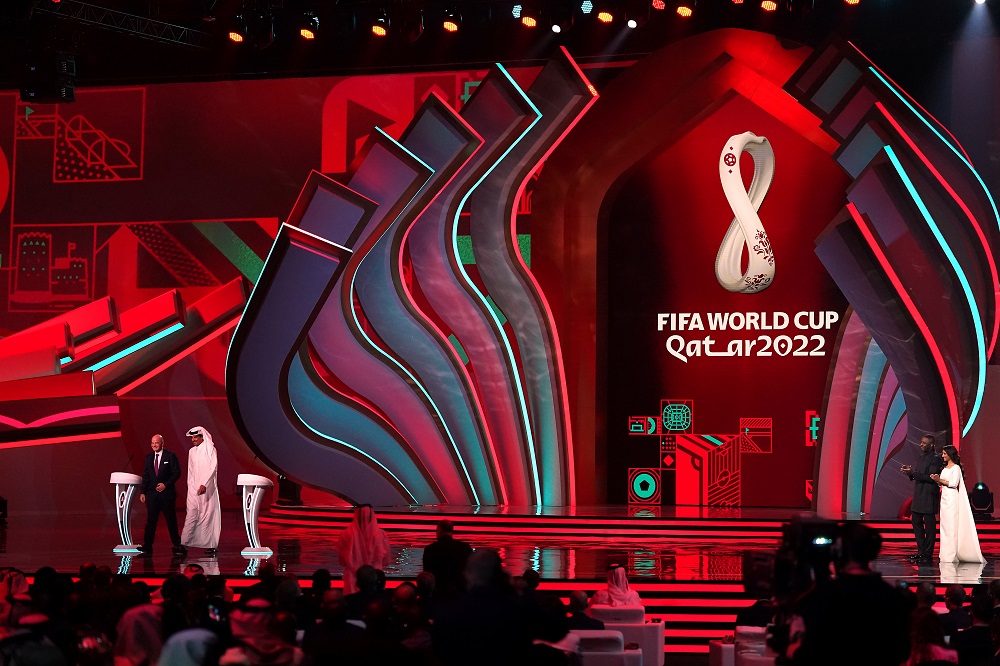Qatar World Cup: Criticism surrounds migrant deaths and LGBTQ+ rights

Qatar was named host of the 2022 men’s football World Cup more than a decade ago and has since faced growing criticism over its human rights record.
As Wales’ first World Cup in 64 years approaches, international media focus has been drawn in particular to the treatment of migrant workers and LGBTQ+ people.
Amnesty International reported last month that, despite some government reforms, human rights abuses in Qatar “persist on a significant scale”.
The Emir, Qatar’s head of state, Sheikh Tamim bin Hamad Al Thani has called the widespread condemnation of the nation an “unprecedented campaign” of “fabrication and double standards”.
So as 1.5 million people prepare to descend on the Gulf state, what are the issues when it comes to Qatar?
Migrant workers, slavery allegations and deaths
There are around two million migrant workers in Qatar, making up 95% of its total labour force, according to Human Rights Watch.
More than one million of those are employed in construction, and have been integral to the country’s infrastructure projects which include the building of seven stadiums, hotels and transport networks to accommodate those visiting for the World Cup.
However, thousands of migrants are alleged to have died suddenly and without investigation in the 12 years since the country was awarded the tournament.
A Guardian investigation found more than 6,500 migrant workers from India, Pakistan, Nepal, Bangladesh and Sri Lanka have died in Qatar since 2010.
The International Trade Union Confederation puts the figure at around 7,000 by the time the tournament starts while Amnesty International reports more than 15,021 foreigners of all ages and occupations died in Qatar between 2010 and 2019.
Qatari authorities claim there have been only three work-related and 34 non work-related deaths in that time.
As the country does not publish statistics or information on migrant worker deaths, the true number is not known and many go unexplained.
Death certificates of young, seemingly healthy men, often state natural causes, respiratory or cardiovascular failure.
Research published in 2019 concluded these deaths were most likely due to heatstroke.
Although the Qatari government introduced a midday hours work ban in May this year, it was found to be ineffective.
Others are believed to have died from road traffic accidents, falls from tall structures, exposure to large machinery and even kidney failure – attributed in part to a lack of clean drinking water.
Exhaustion is also said to be a factor, with migrants made to work 12 or more hours every day for months, or even years, at a time.
Nepalese human rights lawyer Barun Ghimire called the World Cup “blood-stained”.
The kafala, or sponsorship, system of employment is believed to be at the heart of the problems faced by foreign workers.
Human rights groups say it leaves workers at the mercy of their employers who have almost total control over their employment and immigration status, often confiscating their passports, visas and phones when they arrive in the country.
Migrants are exposed to poor working conditions and low wages while some suffer wage theft, debt bondage, racial discrimination and gender-based violence at the hands of their employer.
Reforms from 2017 onwards included the setting of a minimum wage, and in 2020 the kafala system was partly abolished by allowing migrants to change jobs and leave the country without their employer’s permission.
But a failure to implement or enforce the new laws means some of the worst aspects of kafala are still in force and exploitation continues, according to activists.
The Qatar 2022 Committee said it is committed to improving worker welfare but said it “cannot be done overnight”.
A campaign demanding Fifa pay compensation for serious abuses against migrant workers was set up in May.
Danish sportswear company Hummel has toned down Denmark’s kit for the games, even designing a black alternate kit to represent the “mourning” of the thousands of migrant workers alleged to have died.
LGBTQ+ rights and fan safety
Homosexuality is illegal in Qatar and anyone found participating in same-sex sexual activity can be punished by up to seven years in prison.
The nation also operates a version of Islamic Sharia law that criminalises sexual activity between men and carries a maximum penalty of death by stoning, even though there is limited evidence of the law being enforced in recent years.
World Cup organisers have said “everyone is welcome” regardless of a person’s sexual orientation and said guests would not face discrimination.
Spectators will be allowed to display rainbow flags, hold hands and protest peacefully but are asked to be respectful of the country’s customs.
Dr Nas Mohamed, dubbed the “first openly gay Qatari”, has said despite assurances visitors may still be at risk and urged people to “be careful”.
Human Rights Watch found that security forces arrested and detained LGBTQ+ people as recently as September.
Transgender women who were detained were made to attend government-sponsored conversion therapy as a condition of their release, the group said.
Stonewall UK has launched a campaign to fill an 80,000-seat virtual stadium – matching the size of Qatar’s Lusail Stadium – as a show against the treatment of its community members.
British LGBT rights campaigner Peter Tatchell staged a one-man protest in Doha in October and claims he was arrested before being advised to leave the country.
Australian football team the Socceroos became the first national side to speak up on the issue in a powerful video they released last month, in which they spoke about the treatment of migrant workers and urged Qatar to decriminalise same-sex relationships.
Other national teams including Wales, England and Germany intend to wear “One Love” rainbow armbands in solidarity with LGBTQ+ people.
There are concerns a post-tournament crackdown could see the prosecution of Qataris found promoting LGBTQ+ rights.

Gender equality and women’s rights
Women in Qatar continue to face “severe discrimination and violence due to abusive male guardianship policies”, Human Rights Watch reported last year.
The male guardian rules deny women the right to make key decisions about their lives.
Permission is needed by women from their guardian – usually a father or husband – to study abroad, work in government jobs, receive some forms of reproductive health care, drive and marry.
They can be subject to a travel ban by their husband or father at any age and are denied the authority to act as their children’s primary guardian.
Within marriage they are required to submit to their husband’s demands.
A disproportionate number of women are sentenced for extramarital sex, or zina, which is outlawed and capable of being punished by up to seven years imprisonment, flogging if they are not married, and death if they are married, even in cases of alleged rape.
Qatari women told Human Rights Watch their lives are similar to being in quarantine, and even women with jobs say they are treated “as children”, unable to live an independent life.
Freedom of expression and propaganda
It is a criminal offence in Qatar to criticise the Emir, insult the nation’s flag, defame religion, including to blaspheme, or inciting “to overthrow the regime”, according to Human Rights Watch.
The law was amended in January 2020 to impose a harsher sentence of up to five years in prison or a fine of 100,000 Qatari riyal, around £24,455, for anyone found to be spreading rumours or false news with ill-intent.
But the meaning of “fake news” is not defined within the new law.
Amnesty International said authorities in Qatar “continued to curtail freedom of expression using abusive laws to stifle critical voices”.
And as recently as last year, the Qatari authorities arrested foreign journalists for reporting on poor working conditions.
The two Norwegian journalists were detained for trespassing and filming on private property – accusations they denied – and were released 36 hours later without charge.
Former World Cup communications director Abdullah Ibhais was arrested hours before they were due to interview him.
BBC World reporter Mark Lobel and his crew were arrested in 2015, also while investigating the alleged abuse of migrant workers.
Qatari media observe strict self-censorship and avoid criticising the state or government, with domestic audiences catered for by state-run TV and radio.
Forming trade unions and taking part in protests are banned, with rare demonstrations resulting in people being charged and fined.
Kenyan security guard Malcolm Bidali wrote about working conditions in the Gulf state during the preparations for the World Cup and was forcibly disappeared in May 2021.
Held in solitary confinement for a month, he was made to pay a large fine and deported.
Qatar told the Human Rights Council in June that it has a “great interest in promoting and protecting the right to freedom of opinion and expression”.
The government has recruited fans to spread positive messages about the World Cup online in exchange for free travel and accommodation during the tournament.
International media heading to the tournament have been banned from filming in people’s homes and accommodation sites, government buildings, universities, places of worship, hospitals and private businesses.
Fans have been urged not to criticise the country while in Qatar as their communications may be monitored.
Support our Nation today
For the price of a cup of coffee a month you can help us create an independent, not-for-profit, national news service for the people of Wales, by the people of Wales.






How many people who read this article will still support the Welsh team going to Qatar? Why is Drakeford going? If Wales is serious about human rights there is only one thing to do.
The Welsh FA’s support for the ‘One Love’ campaign, and in other statements theyve made, shows that they are serious about human rights. Fifa are to blame for this situation in awarding it to a country with a poor human rights record in the first place (course they did the same in awarding it to putin’s dictatorship 4 years ago….and believe it or not there are strong rumours theyll award it to the abominable saudi regime in 2030).
If any nation, including yours, is serious about human rights there is only one thing to do. But they aren’t. So we tar all of them or none of them. MPs from Mordor are going too. Although most senior Mordor MPs and royals currently “have no plans…” which means they are trying to avoid criticism for now. Should England get out of the knockout stages they will “support an English team doing well on the international stage” whilst “condemning in the strongest terms” (translated: empty statement, vague terms , no follow through) the Qatari regime’s human rights record